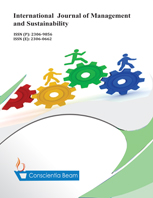The effect of E-HRM practices on the performance of academic staff: The mediating role of trust
DOI:
https://doi.org/10.18488/11.v13i2.3757Abstract
The purpose of this study is to investigate the effect of electronic human resource management (E-HRM) on the performance of academic staff (PAS) at Amman universities. In today's modern freelance and remote working society, employee performance (EP) has become an important topic in recent studies. This performance is more critical for educational institutions as they move to more virtual classes and meeting discussions. The move to the virtual world forced the organization to conduct most of its work online, which requires trust. Prior literature has focused on EP in business organizations, and minimal studies have examined this topic in educational settings among academic staff. The study also examines the mediating role of trust between E-HRM and PAS. Based on the literature, the study proposes a positive effect of E-HRM on PAS, and trust will mediate this effect. The population of this study is the academic staff in Amman, the capital of Jordan. A total of 332 responses were collected using stratified random sampling. The data was collected via an online questionnaire shared among the population. Smart Partial Least Squares (Smart PLS) was used to analyze the data. The finding showed that E-HRM and its dimensions, such as E-selection, E-training, and E-development, positively affected PAS. E-recruitment, E-performance appraisal, and E-compensation have an insignificant effect. The findings also showed that trust partially mediated the impact of E-HRM on PAS. E-HRM collectively is vital to improving PAS, and the selection and training process can play an essential role in enhancing PAS.

